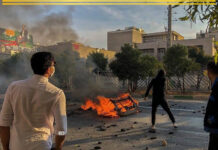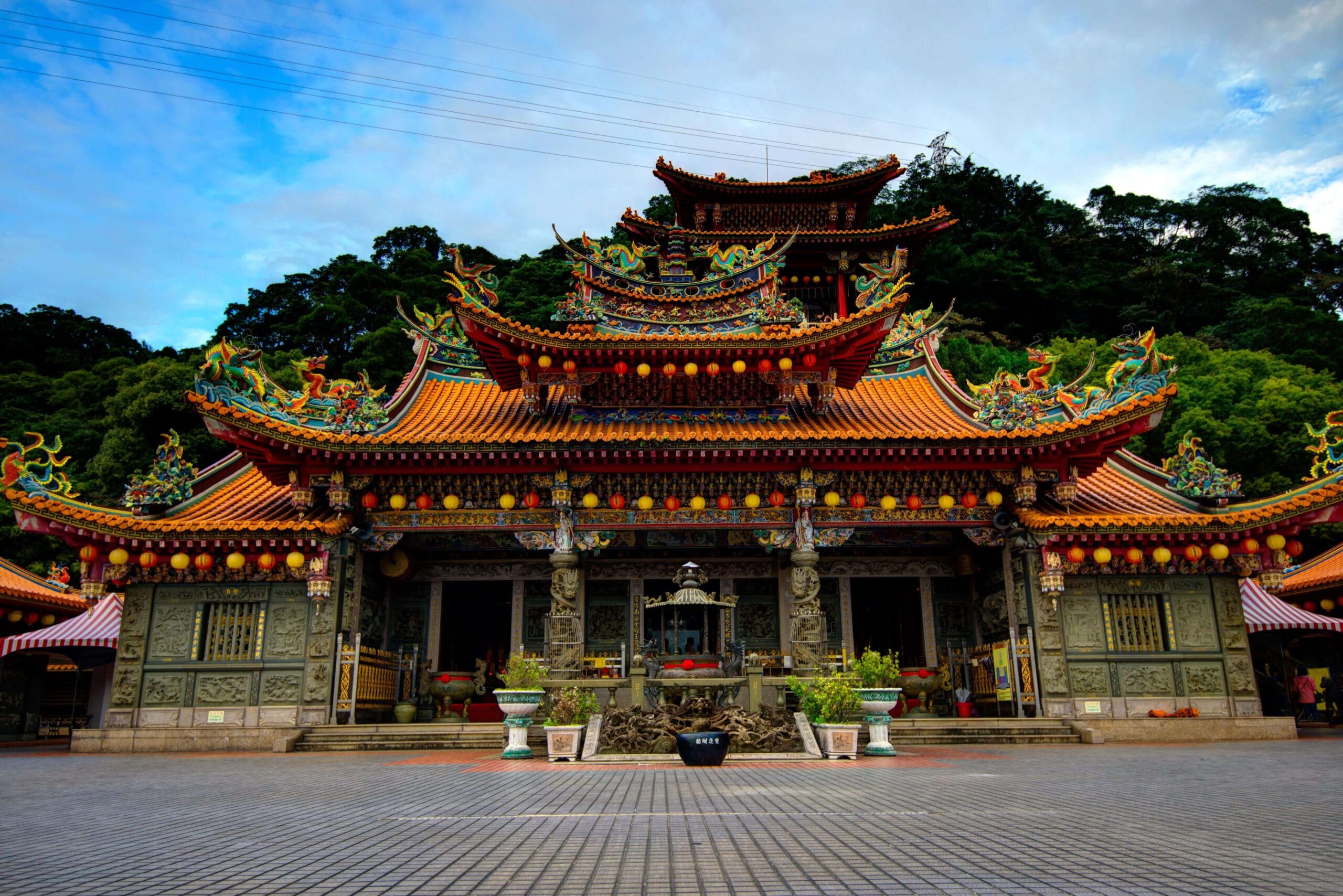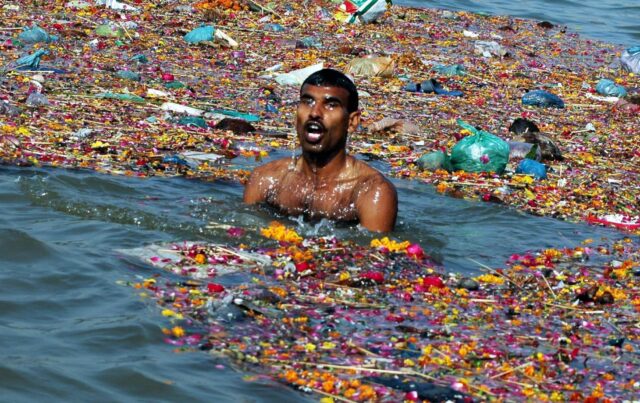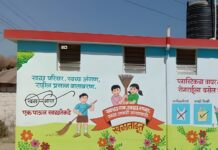Unlike in Hinduism, where people offer milk along with a plethora of other materials from ghee to flowers while visiting their holy places, there’s a temple in Thailand where you just need a plastic bottle or a bag to get blessings from Phra Maha Pranom.
Phra Maha Pranom is the acting abbot at Wat Chak Daeng Temple, who’s leading a massive recycling effort to curb plastic waste entering the Chao Phraya River.
Plastic And Faith: A Match Made In Thailand
Conventionally, in most Buddhist temples, people offer food and clothes to the residing monks in exchange for blessings.
However, at Wat Chak Daeng Temple in the south of Bangkok, devotees offer plastic bags and bottles in exchange for blessings. Plastic bottles and bags are then recycled into the fabric for the monks’ robes.
According to a report in 2017, Thailand ranks among one of the five countries in the world that accounts for more than half of the plastic in the oceans.
In an attempt to curb plastic waste entering the Chao Phraya River, which flows south to the Gulf of Thailand in the Western Pacific Ocean, the monks of Wat Chak Daeng Temple have crushed about 40,000 kgs of plastic over two years and have produced at least 800 sets of robes, and has more in production.
Each set of robes sells for between 2,000 baht (Rs 4,567) and 5,000 baht (Rs 11,422) to keep funding of the project afloat and pay the waste-sorting volunteers, which consists of local housewives, retirees, and differently-abled people.
It might not be a surprise that Wat Chak Daeng isn’t the only temple in Thailand that mixes plastic and faith in the colour green.
The Buddhist temple Wat Pa Maha Chedi Kaew in the Sisaket province of Thailand, also known as Wat Lan Kuad or ‘Temple of a million bottles’ is made of over a million beer bottles.
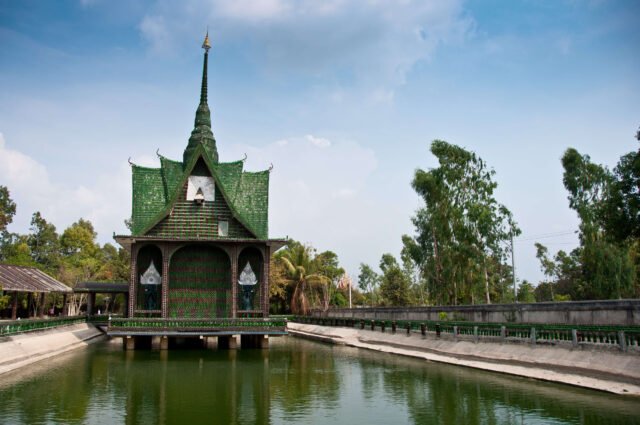
Locals in the province are encouraged to deposit bottles to use as construction material for buildings. The temple complex consists of around 20 such buildings, all made from bottles.
Read more: Placenta With Plastics: Microplastic Pollution Reaches The Unborn Babies
India: The Land Where The Rivers Weeps
As much as this initiative seems praiseworthy and innovative, it also compels us to shed a bit of light on our country’s state. If we were to take a closer look at the practices and rituals that we carry out in the name of religion and faith, most of which are not even remotely connected to the fundamentals of the subject.
To put it simply, there’s a massive gap between theory and practice. In India, the Ganga and Yamuna are more than rivers to every devout Hindu. They are revered as living goddesses in the material world.
However, the irony of the ironies is that even if Lord Krishna were to cross the Yamuna, as in stories of his birth told, the putrid stench emanating from the water would be so unbearable that the Lord himself wouldn’t even dare to enter the river.
And if Krishna were to sip the water of the Ganges, he would need to summon all the supernatural powers at his disposal to stay alive. The Yamuna and the Ganga have been polluted beyond imagination, mostly by those claiming to be Lord devotees.
Mass bathing, defecation, and immersion of dead bodies and idols, along with high levels of organic matter, have severely polluted the sacred rivers.
Living goddess or not, rivers have always been the mother of every civilization. However, it seems that we have long forgotten that the idea behind the concept of reverence of ‘rivers and mountains’ in Hindu scriptures is purely environmental.
Just because for many of us, water simply flows from a faucet (water tap), we think little about it beyond this point. As a result, we have lost every ounce of respect for the wild and mighty rivers, for the complex and holistic working of a wetland, and for the intricate web of life that these rivers support and sustain.
Image credits: Google images
Sources: Times of India, Down to Earth
Find the blogger at @sejalsejals38
This post is tagged under: Wat Chak Daeng Temple, Wat Chak Daeng Temple in Thailand, Top 5 plastic contributing countries, Which country contributes to most plastic waste, Plastic waste, Plastic waste in Oceans, Water pollution, Plastic, Plastic pollution, Recycling tips, Plastic recycling tricks, How can you recycle plastic, Reuse, reduce, How to reduce plastic pollution, Ganga, Yamuna, Chao Phraya River, Wat Lan Kuad, Temple of a million bottles, What is Temple of a million bottles, What is Wat Lan Kuad, where do Chao Phraya River flow, Kumbh, Kumbh Maha Mela, Lord Krishna, Thailand, Why are the Ganga and the Yamuna so polluted, What has caused the massive deterioration of the Ganga and the Yamuna, How a plastic bottle can get you a blessing at this temple in Thailand
Other recommendations:
How Something As Damaging As Plastic Has Become Our Savior During COVID-19







